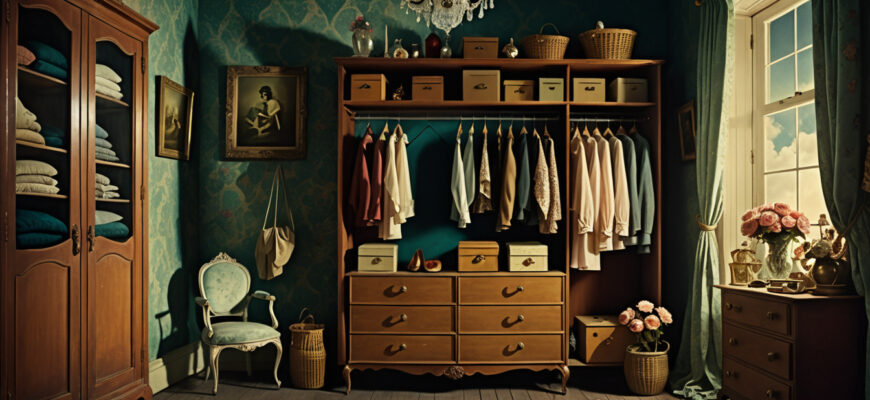Dreaming of a closet often stirs a mix of curiosity and unease—what’s really behind that closed door? In the language of dreams, closets are far from mundane storage spots. They’re secret compartments within the psyche, places where bits of ourselves get tucked away—sometimes because we’re not ready to face them or share them with the world. A closet in a dream can symbolize everything from buried trauma and shame to hidden talents and secret longings. These spaces invite a kind of self-exploration that’s both tender and challenging, nudging us toward what we’ve kept locked up, whether out of fear, protection, or habit.
The Closet In Dreams: A Gateway To The Hidden Self
Closets in dreams aren’t just closets—they function as secret chambers for the parts of ourselves that aren’t fully visible. Whether those parts are shadows we shy away from or gifts waiting to be unwrapped, the closet represents what the psyche holds in trust or confinement. Sometimes it’s the stories we hide because they’re painful, like trauma or shame. Other times, it’s the parts of our identity or desires we’re just learning to acknowledge.
Dreams featuring closets often beckon with complexity, because the closet guards what feels too sensitive or vulnerable to reveal. That door creates a safe boundary between inner realities and outer exposure. What does it mean when the closet door is open? When it’s locked tight? Or cluttered beyond recognition? Each scene can carry intense emotional weight. Closets can feel heavy with the burden of secrets, the residue of past wounds, or the sparkle of unexplored potentials. A messy closet spiraling with forgotten memories or tangled feelings may speak to internal chaos, while an empty closet might whisper of release or loss.
Queer And Feminist Perspectives On The Closet
The phrase “in the closet” holds historic and political power, especially within queer communities. For many, the closet is not just a place to hide but a survival tactic, a necessary refuge in a world that doesn’t always offer safety for authenticity. Dreaming of closets through a queer lens often stirs themes of identity negotiation, fear around disclosure, and the yearning for freedom that “coming out” embodies. The closet protects but also confines, creating complex emotional landscapes where safety and limitation coexist.
Feminist readings of the closet reveal its role in shaping personal identity and acts of disclosure. The closet is where much of the unseen work of identity formation unfolds, a crucible for wrestling with societal expectations and self-acceptance. “Coming out” becomes a fraught but powerful act, loaded with cultural weight around visibility and secrecy. The politics of secrecy go deeper than the personal—they touch on societal norms and the often risky act of revealing one’s truest self amidst those pressures.
| Aspect | Queer Perspective | Feminist Perspective |
|---|---|---|
| Closet as | Survival space and site of protection | Space for identity formation and self-reflection |
| Disclosure | Coming out as identity and political act | Disclosure as boundary-setting and self-empowerment |
| Impact | Complex emotions of fear, hope, and resistance | Navigating societal norms and patriarchal pressures |
Variations Of Closet Dreams And Their Immediate Meanings
Closet dreams show up in different forms, each carrying its own message:
- Open closets often suggest readiness to embrace and show hidden parts of the self, a breakthrough in self-acceptance or willingness to be seen.
- Messy closets can reveal inner turmoil, unresolved feelings, or tangled desires that need sorting out or gentle tending.
- Haunted or locked closets point to shadow sides, old wounds, or resistance to facing painful truths—sometimes the closet holds ghosts from the past or fears we keep pushing aside.
Dreamers might wake up feeling anxious when trapped in a locked closet or oddly relieved when it’s empty. These emotions offer valuable clues about what’s going on under the surface. Sometimes the act of cleaning out or organizing a closet in a dream signals a desire to process, heal, or liberate repressed parts. The closet’s condition becomes a mirror of your internal state and invites questions like: Which parts of myself am I hiding? What am I ready to release? What’s yearning for light?
Psychological Dimensions of Closet Dreams
What parts of yourself do you tuck away when no one’s looking? What old fears keep your inner world locked tight? Dream closets aren’t about IKEA furniture—they’re a powerful symbol of what’s hidden in the psyche. In psychoanalytic theory, the closet stands as a metaphor for repression and concealment. It’s the sacred vault where feelings, memories, and desires you’re not yet ready to own or share get stashed away, often under layers of shame or fear.
Jungian psychology calls this unacknowledged realm the “shadow self”—that part of the soul that we deny or push out of conscious view. Dreams about closets can show you where those shadows lurk. A locked closet in a dream often signals unresolved trauma or emotional wounds buried deep beneath the surface. Maybe it’s a secret fear, pain from past experiences, or that part of your identity you’ve kept hidden to protect yourself. Sometimes, the closet isn’t just a hiding place but a container of shame you’ve internalized, and these dreams summon you to reckon with what’s stored inside.
But not all closet dreams carry the weight of darkness. An open or clean closet appearing in sleep can reflect readiness to confront and integrate these hidden parts. Facing the contents of a dream closet can be the first radical step toward healing, self-acceptance, and growth. It’s like turning on the light in a long-forgotten room of your mind and saying, “You’re safe now.” The emotional resistance you feel around the closet can tell you a lot about what needs kindness and courage.
Here are some questions to hold close when the closet shows up in your dreams:
- What feelings arise when you imagine opening your dream closet?
- Which hidden truths or parts of yourself are you protecting or denying?
- What fears keep you locked away, and what might happen if you let those doors swing wide?
- Could there be gifts or strengths folded into that hidden space, waiting for acknowledgment?
Contemplating these questions deepens your relationship with the concealed dimensions of self. Dream closets nudge you to lean into vulnerability as a path toward wholeness. Remember, the closet isn’t just a place to hide—it’s also a place from which you can step into freedom. Self-knowledge through these dreams becomes a gentle revolution, a quiet rebellion against internal exile. You were born for this.
Spiritual and Energetic Meanings of Closet Imagery
On a spiritual level, the closet can feel like an inner sanctuary or a hidden room within your soul—a sacred inner chamber holding both gifts and blockages. It’s not simply a storage space but a threshold where spiritual energy is stored, contained, or sometimes stifled. What’s locked inside might be dormant talents, intuitive wisdom, or energetic wounds that need tending.
Shadow work often begins here, inviting you to meet whatever lurks in your soul’s closet—those parts that are messy, uncomfortable, or distorted. This intimate encounter asks for deep honesty and radical compassion. The spiritual closet can reveal parts of your essence you’ve shut away because they were too much for others or yourself to hold. Yet, these hidden pieces carry the seeds of transformation and profound healing when honored.
Rituals of release and affirmation offer a way to claim your spiritual closets. You can:
- Light a candle as a symbol of illumination and courage to face what’s inside
- Speak affirmations that invite growth and openness like “I welcome all parts of my being with love”
- Physically clean a closet or a personal space as an energetic clearing practice
- Use breathwork or meditation to explore the sensations around your inner concealed spaces
Dream closets become sensitive barometers of your cosmic weather, reporting on internal blockages or breakthroughs. The imagery might signal a time of upcoming personal change, spiritual stirring, or the need to shed emotional burdens to make space for new light. When the closet appears in dreams, it’s a whisper from your soul: it’s time to tend those hidden rooms, to invite healing energy to flow freely.
Cultural and Collective Layers: Beyond the Personal
Closets carry weight far beyond individual psychology—they connect to shared social experiences and histories, especially within LGBTQ+ communities and feminist struggles. The phrase “coming out of the closet” is loaded with political, emotional, and cultural meaning. It speaks to the lived reality of hiding one’s true identity for safety, belonging, or survival. Dream closets can echo this collective tension between concealment and visibility, shame and pride.
Historical traumas have been encoded in closet imagery as well. Families and societies have carried secrets, silences, and inherited shame passed down through generations. These collective wounds sometimes manifest in dreams, urging communities to break cycles of hiding and to find power in shared story and collective witnessing.
The boundary between public and private self is the stage for ongoing cultural politics of hiding and revealing. Who gets to be seen fully, and who must build walls to keep parts of themselves invisible? These dynamics manifest in closet symbolism as well—a reflection of societal pressure to conform or to stay silent.
Breaking open the closet becomes an act of liberation not only for individuals but for groups and communities. Self-knowledge operates as a collective force, pushing toward social justice and collective healing. When enough closets open, whole cultures shift with more truth, authenticity, and radical acceptance. In this, the dream of the closet is much more than a private image—it’s a call to communal freedom. You were born for this kind of liberation.








